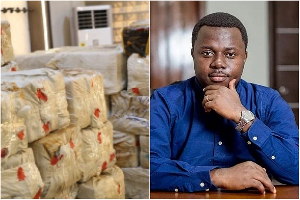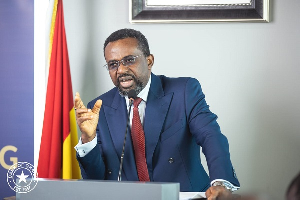By Kofi Akosah-Sarpong*
United States President Barack Obama’s November 6 visit to India has brought into the forefront the long-running issue of what development philosophy is appropriate for each developing region, especially Africa where there hasn’t been any clear-cut development philosophy.
Ahead of Obama, Larry Summers, Obama's economic policy point-man, in New Delhi, India touted China’s and India’s development successes, grappled with whether China’s Beijing Consensus or India’s Mumbai Consensus was better for the rest of the developing world. With Brazil’s success over the years that has seen millions of Brazilians moved out of poverty and built an economy in which the middle class is the majority, we can safely say there is Sao Paulo Consensus in South America. That makes the African region as the only place without a notable developmental Consensus distilled from within itself.
Such issues have cropped up because the dominant Washington Consensus has been dictating development doctrine for the developing world since 1989, especially Africa which is disadvantaged in the international political economy and which has had crisis-wrecked economic development.
The Washington Consensus set specific economic policy prescriptions such as legal security for property rights, fiscal discipline, tax reforms, interest rates that are market determined, liberalization of inward foreign direct investment, privatization of state enterprises, competitive exchange rates, among others, that constitute the “standard” reform package promoted for crisis-ridden developing countries by Washington, D.C. based institutions such as the International Monetary Fund and World Bank.
Honestly, all the above prescription has everything to do with discipline. For some time, such prescriptions were virtually imposed without considering each country’s situation. Africa has suffered dearly because of such uninformed thinking.
Sadly, Summers didn’t mention an African Consensus because there is none. But his message is clear to Africa since Africa is part of the international development system. If there are Beijing Consensus and Mumbai Consensus, where is the African Consensus? As Michael Schuman (of the USA-based Time magazine) explains while “some believe that China's state-heavy, semi-market economy -- or “state capitalism”” is the ideal model for developing countries, Summers think “Instead, a Mumbai Consensus based on the idea of a democratic developmental state, driven not by a mercantilist emphasis on exports, but a people-centered emphasis on growing levels of consumptions and a widening middle class.”
Generally, in the Beijing and Mumbai models what is important is their ability to tinker with the Washington Consensus to their innate traditional values and histories, and, in the process, have “boasted an incredible record of alleviating poverty, building industry, creating jobs, and translating economic power into political power.” Alright, this isn’t all that new to Africa – that’s the ability to mix their traditional values with the global prosperity ones, Botswana has been able to do this and they doing fine. But of concern here is the need for an African Consensus. Botswana could be used as rallying model, though, as a take-off for an African Consensus.
In wrestling with either Washington Consensus or the Beijing Consensus, Summers opts for the Mumbai Consensus – “a third way not based on ideas of laissez-faire capitalism that have proven obsolete or ideas of authoritarian capitalism that ultimately will prove not to be enduringly successful.” The lesson here is that both China and India have not abandoned the principles of the Washington Consensus but have appropriated them into their innate traditional values and mixed both ideals reasonably well for their progress. China’s traditional Confucianism mixed with dose of communism and capitalism, for example.
The fact is Africa had had a peak into both the Chinese and the Indian models but didn’t work them out appropriately from within its traditional values upward for sustainability and progress. Ask Mathieu Kerekou (Benin Republic) and Menghistu Haile Mariam (Ethiopia) about this. At issue is development thinking that emanates from the core ideals of African traditional values and rational realities. The product of this mixture can aptly be called, both philosophically and practically, the African Consensus.
Waiting to be mixed and appropriated, all the ingredients for an eventual African Consensus are there to be used – the problem is lack of spiritual and political will. From Kwame Nkrumah to Thabo Mbeki, the talks have been superb but the actions are empty. The cultures are there to be collated as symbols for continental unifier and the spiritual lubricant to drive progress; from ECOWAS to SADC, the regional organizations are there for the construction of the African Consensus; the over one billion African people are there for solidly huge internal market; and aside from the African Development Bank, other institutions are increasingly being developed that can launch the Africa Consensus.
Either as if being held by some unseen forces or more correctly poor leadership, ex-Ghanaian President John Kufour has bemoaned African leaders’ unwillingness to integrate their economies. Kufour’s concerns reflects the fact that 50 years ago, African founding fathers such as Kwame Nkrumah passionately promoted Pan-Africanism, among its striking attributes, as means of uniting Africa politically and economically. But African leaders are yet to appropriate it gamely for greater progress.
Yes, regional blocks such as ECOWAS are on the ascendency but the direction towards a continental African Consensus such as China’s or India’s cannot be seen on the African development radar. How can an African Consensus happen when majority of Africans in the traditional, informal sector, where most of the wealth are located and entrapped, as the rapid expansion of the mobile phone phenomena across the continent shows, aren’t factored in when policies are being created?
The ability of African leaders to midwife an African Consensus will be a response to Summers’ views and an answer to Michael Schuman wearily asking, “India vs. China: Which is the best role model for the developing world?” While India or China may be of admirable development footnote to Africa, of advancement lesson is the fact that their successes are partly driven by their core traditional values that drives their mentality, discipline and work ethic. Yes, as Schuman indicated, “every up-and-coming poor nation wants to “be like China;” why not, for the good life, isn’t it? But how Africa will be like China or India involves clear substantial thinking from within African traditional values by Africa’s leaders.
That means reasoning from within Africa’s cultural realities, that’s from within its peoples. After 50 years of Africa’s birth, even some well-placed African policy makers and editorialists doubt the development policies currently running Africa. The Accra, Ghana-based Daily Graphic and The Ghanaian Chronicle doubt the current development policies running Africa. The policies are tortuous; they aren’t overwhelmingly brewed from within African cultural realities. China and India teaches Africa that the Washington Consensus principles only cannot flower an African Consensus – for psychological and historical reasons part of game has come from within Africans’ cultural ideals.
While China may have its own unique history, India’s has a bit of Africa’s – European colonialism. As a development venture, African states were founded on ex-colonial Western development paradigms that didn’t adequately factor in African cultural values. The Beijing and Mumbai Consensus because their leaders were able to move beyond the dominant Western paradigms by re-orientating their development ideals and manufactured from within their cultural tenets, and driven by responsible leadership.
As the African development situation increasingly opens up, the strategy is to simultaneously appropriate the enabling aspects of the African culture and refine the inhibiting values for progress. From Southeast Asian to Europe, nations that have prospered, and sustained it, have done so from within their core cultural values and play them with other worldly prosperity ideals.
Consequently, this question from Schuman will be appropriate to African leaders, elites and the mass media: “So what’s a better model for” Africa’s progress? “… The Mumbai Consensus or the Beijing Consensus?” The best model for Africa isn’t either, but the one from within Africa. But occasionally, Africans could draw lessons from the Chinese and the Indian models. It is such new thinking that will help grow the real African Consensus, and open the way to the renewal of Africa’s progress.
*Kofi Akosah-Sarpong is a journalist and academic
Opinions of Wednesday, 17 November 2010
Columnist: Akosah-Sarpong, Kofi














